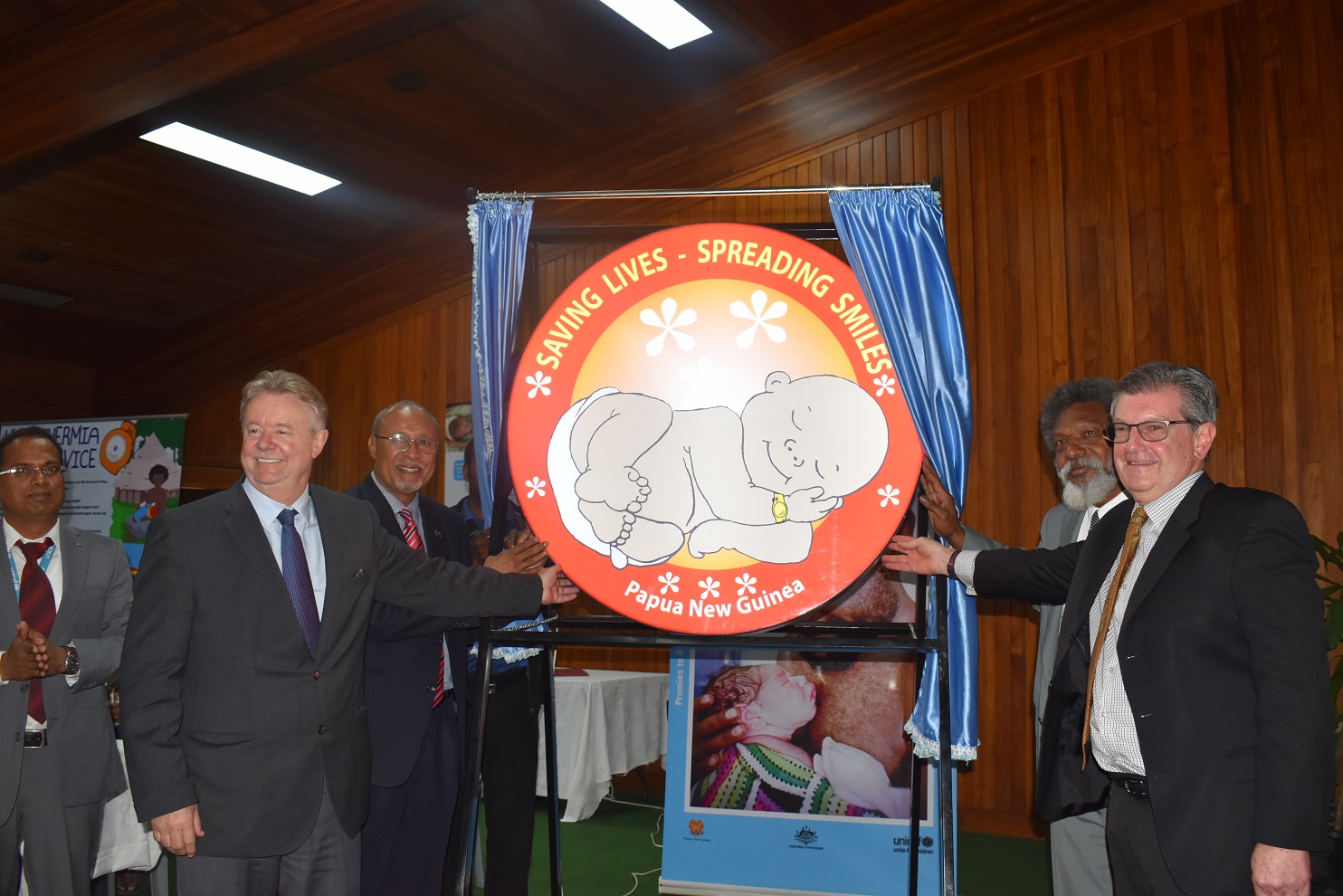PORT MORESBY, 11 September, 2018 – A new maternal and newborn care project was launched in Port Moresby today. The project focuses on preventing and managing bleeding after delivery, a common cause of death in mothers and neonatal hypothermia (low body temperature) in newborns.
The project is supported by the Australian Government at a cost of AUD2.9million (PGK9 million) and will be rolled out by UNICEF in partnership with the National Department of Health. More than 150, 000 babies born over the next three years and their mothers will benefit from the project.
The project provides a comprehensive package of care which involves the prevention and management of bleeding after delivery that is supported by a Non-Pneumatic Anti-Shock Garment (NASG) for mothers while a hypothermia alert device known locally as the Bebi Kol Kilok will be used to prevent and manage neonatal hypothermia for the babies.
The package of care will address critical child survival issues such as warmth or thermal protection for newborns, proper breastfeeding support, basic care for infections and breathing difficulties during the baby’s most vulnerable period in the first month of life. For mothers, the package of care will involve Active Management of Third Stage of Labour (AMTSL), Prevention and management PPH (post-partum haemorrhage) and maternal anaemia and Post-Natal Care to mother through community health workers (VHV) for early detection and referral of sick mothers
“Our government is focused on reducing the high maternal and neonatal mortality rates. This is a highly cost-effective intervention and I call on everyone to participate to give every child a chance in life. I’m also very excited that fathers are recognizing the important role they can play in baby care by holding the baby close to their body for warmth,” the Minister for Health and HIV/AIDS, Hon. Sir Puka Temu said.
Australia’s funding support will enable UNICEF to work with the PNG Government to strengthen local capacity in hospitals and health facilities deliver the package of maternal and newborn care, assess and remove bottlenecks in the delivery of maternal and newborn care services and empower communities with skills to continue care at home.
Australia's High Commissioner to Papua New Guinea, Bruce Davis said: “We are very keen to be an active player in all aspects of this health work and to support strongly the Papua New Guinean Government’s own efforts in ensuring that there’s a good improvement in health indicators.”
“UNICEF PNG is very grateful for this funding support that will help the Government of PNG to reduce maternal and neonatal deaths by promoting simple cost effective and life-saving practices that are crucial for mothers and newborns to survive,” said UNICEF Representative, David Mcloughlin.
Papua New Guinea has an alarmingly high rate of newborn deaths, with about 6000 babies dying every year before they reach four weeks of age. This accounts for about 17 newborns a day, a rate that has not improved in the last 20 years and is also the highest in the region. Correct hypothermia management can prevent 42 per cent of these deaths. In 2017, the first phase of the newborn care programme was successfully piloted in Port Moresby General Hospital, Goroka Provincial Hospital and Henganofi District, Eastern Highlands Province. Results of the one year trial showed a decrease in hypothermia cases from 51.6 percent to 40.2 percent (NCD) and 21.3 percent to 17.5 percent in EHP since the trial started. The trial also found that up to 47.0 per cent fathers/male members are getting involved in the care of their baby.
UNICEF in collaboration with the Department of Health will work directly with provincial health authorities/offices, the district authorities, church health services and local non-government organisations to roll out the first round of facility based maternal and newborn care in all provincial hospitals and district facilities. Seven additional districts will roll out community based maternal and newborn care in facilities that deliver more than 50 babies per years.
For further information, including access to related materials, please contact the Australian High Commission media team: +675 7090 0100

Officially launching the project; UNICEF Representative, David Mcloughlin (left), Health and HIV/AIDS Minister Sir Puka Temu (second from left), Australian High Commissioner Bruce Davis (right) and Parliament Speaker and Manus MP Job Pomat (second from right).
